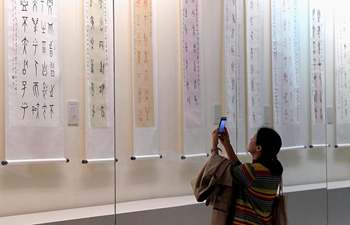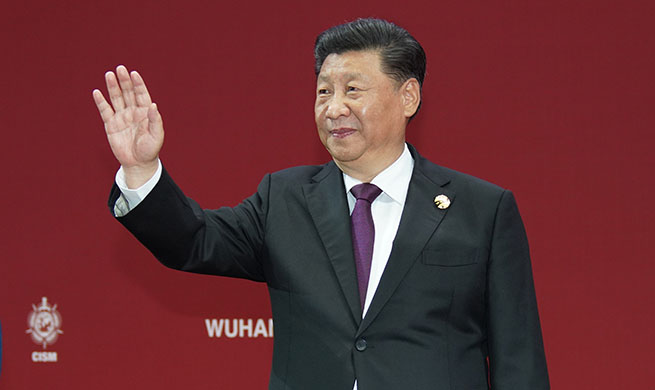ROME, Oct. 19 (Xinhua) -- An Italian dictionary-maker is trying to make sure Italian speakers are never without the right words, no matter how obscure the words may be.
Publisher Zanichelli will tour Italy with a two-meter-tall dictionary that features a total of 3,126 words it says are in danger of disappearing. The goal, the company says, is to call attention to the words in hopes of preventing them from disappearing from the language.
"The capacity to choose the right term, a perfect fit for what one wants to express, helps us express ourselves effectively and clearly," Zanichelli said in a press statement.
Also part of the initiative: a Zanichelli social media account that highlights one of the 3,126 words each day, as well as a collaboration agreement with fashion brand MSGM, which has launched a new collection of clothing, with each piece named for one of the words in the over-sized dictionary, including "ipavido" (which means "fearless"), "vivendo" ("vivid"), and "radioso" ("radiant").
Other selections from the touring dictionary include: "adombrarsi" ("to darken"), "desueto" ("obsolete"), "icastico" ("effective"), "noncuranza" ("carlessness"), and "reboante" ("pompous").
According to Ethnologue, a publication that focuses on linguistic issues, Italian is spoken by around 60 million people worldwide. That places it far behind other major European languages such as French (spoken fluently by around 130 million people worldwide), English (510 million fluent speakers), Portuguese (215 million), Spanish (420 million), and German (230 million). Fewer speakers can put a language at a disadvantage in terms of vibrancy and innovation.
According to Masimo Cerruti, a professor of linguistics at the University of Turin, Italian also suffers from close contact with English, which often results in foreign words entering the language and replacing native words.
"Like many languages, Italian borrows' words from English and other languages and in some cases the new words push the traditional vocabulary into obscurity," Cerruti told Xinhua. "That's especially true (in Italy) where words in English are seen as having a certain kind of prestige when used."
Claudio Marazzini, president of the Crusca Academy, a society for linguists and philologists, Italian finds itself in an increasingly delicate situation.
"Words come and go, that is not unusual," Marazzini, the author of a book called "L'Italiano e' Meraviglioso: Come e perche' dobbiamo salvare la nostra lingua" (Italian is Marvelous: How and why we must save our language) said in an interview.
Marazzini said it isn't as important how many people speak a language as it is how well they use it and how widely certain words are used. He said that in this regard Italian is at risk.
"Some words fall out of favor and some new ones pop up," he said. "What is a problem is that language is being simplified. In general, we use too few words to express our ideas. On average, we don't understand the language as well as previous generations. This trend leaves us poorer."













